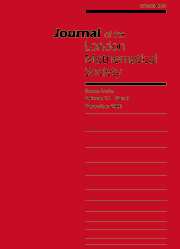No CrossRef data available.
Article contents
A CLASSIFICATION OF THE PRINCIPAL NILPOTENT PAIRS IN SIMPLE LIE ALGEBRAS AND RELATED PROBLEMS
Published online by Cambridge University Press: 08 April 2017
Abstract
Let [gfr ] be a semisimple Lie algebra over an algebraically closed field [ ] of characteristic zero and G be its adjoint group. The notion of a principal nilpotent pair is a double counterpart of the notion of a regular (= principal) nilpotent element in [gfr ]. Roughly speaking, a principal nilpotent pair e = (e1, e2) consists of two commuting elements in [gfr ] that can independently be contracted to the origin and such that their simultaneous centralizer has the minimal possible dimension, that is, rk[gfr ]. The definition and the basic results are due to V. Ginzburg [3]. He showed that the theory of principal nilpotent pairs yields a refinement of well-known results by B. Kostant on regular nilpotent elements in [gfr ] and has interesting applications to representation theory. In particular, he proved that the number of G-orbits of principal nilpotent pairs is finite and gave a classification for [gfr ] = [sfr ][lfr ]([ ]). Trying to achieve a greater generality, Ginzburg also introduced a wider class of distinguished nilpotent pairs and, again, classified them for [sfr ][lfr ]([ ]). (The precise definitions for all notions related to nilpotent pairs are found in §1.)
- Type
- Notes and Papers
- Information
- Copyright
- The London Mathematical Society 2001




